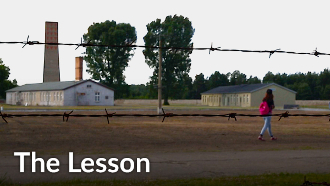
The Lesson 2020
Distributed by The Video Project, 145 - 9th St., Suite 230, San Francisco, CA 94103; 800-475-2638
Produced by Elena Horn and Alevtina Nepomniachtchikh
Directed by Elena Horn
Streaming, 60 mins
Middle School - General Adult
Education; Germany; Jewish Holocaust
Date Entered: 09/08/2021
Reviewed by Michael A. LaMagna, Associate Professor & Reference Librarian, Delaware County Community College, Media, PAThrough a mix of impactful archival footage gathered from home movies and the documentation of the educational journey of four children over the course of five years from 2014 to 2019, The Lesson examines how a country remembers and teaches its past. Horn (Director/ Producer) opens the film recounting her own experience of learning about the Holocaust through the German education system and revisits this education in the small, rural town she was raised.
The viewer is first introduced to the four children in 7th grade as they are introduced to the Holocaust. In preparation for a field trip to Sachsenhausen concentration camp, students complete an assignment based on a discussion of the architectural design of the camp. As Horn notes, missing from this assignment was any images or recordings of the lived experience of those forcibly brought to the concentration camp, as well as the inhumane conditions. In a striking scene, the teacher breaks down as the students tour the concentration camp because one can assume, he understands the gravity of what occurred at that location.
Throughout the film, it is clear many Germans struggle with how to remember and teach the history of the Holocaust. This conflict is demonstrated through the interactions students have with those outside their classroom. Many Germans do not like to discuss their own experience during World War II because of a lack of historical distance or their proximate involvement in the war effort. This lack of discussion even between family members creates an environment in which these students receive diverse messages about the Holocaust. This disconnect becomes apparent as one student tries to understand her own grandfather's involvement as he was an officer in the military while being known as a caring family member.
A backdrop to documenting how the Holocaust is taught in German schools, the filming coincided with refugees from Syria, Iraq, and Afghanistan fleeing to Europe and in particular Germany. The connection between the current xenophobia at the time of filming and its similarity to the sentiment of Nazi Germany was evident. Based on the lessons these students are learning and the conflicting messages these students are receiving outside of the classroom, General Dwight D. Eisenhower was correct to order images of the atrocities be captured through photograph and film as the concentration camps were being liberated at the end of World War II to ensure no one can deny the horrors that happened.
This film is beautifully shot with quality audio throughout. The only exception was a few moments with Horn’s voiceover which could have been louder. Interviews with the children are in German with English subtitles. The subtitles do not distract from the film and are easy to read as the text is not washed out by the images on screen. The only minor critique would be the need to identify the four students by name along with the year to ensure the viewer understands when in time discussions are happening.
While the immediate inclination is to position a film like this within a history, holocaust studies, or political science collection which is correct; however, the value of the film is for an education collection supporting future or current history teachers to understand their role in placing significant historical events into the proper context. This film is highly recommended for all collections as this film provides an understanding of how the Holocaust is taught in Germany and will likely lead to immediate discussions of how other historically significant events (such as slavery in the United States) are taught within schools.
Awards:Flickers' Rhode Island International Film Festival, Grand Prize, International Humanitarian Award; Reel 2 Real International Film Festival for Youth, Edith Lando Peace Prize
Published and licensed under the Creative Commons Attribution 4.0 license. Anyone can use these reviews, so long as they comply with the terms of the license.